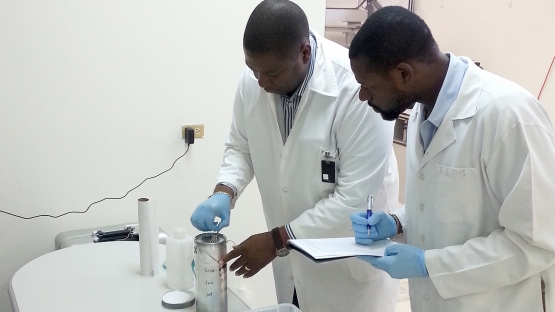Jamaica completed the conversion of its research reactor to low enriched uranium (LEU) fuel earlier this month, decreasing proliferation risks while doubling the reactor’s utilization capacity. The removal of the highly enriched uranium (HEU) fuel to the United States means the Caribbean region is now completely free of HEU.
The conversion of the SLOWPOKE reactor was part of a joint effort between Jamaica and the United States’ Department of Energy’s National Nuclear Security Administration, with support from the International Atomic Energy Agency (IAEA). The successful conversion and return to full operation on the LEU core, provided through the IAEA, was announced by Charles Grant, Director General of the International Centre for Environmental and Nuclear Sciences (ICENS) during the annual Reduced Enrichment for Research and Test Reactor (RERTR) International Meeting in Seoul earlier this week.
The 20 kW research reactor, the only one in the Caribbean, has operated at the University of West Indies for over 30 years. Jamaican scientists plan to expand research work related to food safety, food security, water and air quality. See our earlier article on their plans for the utilization of the research reactor with the LEU fuel.
“Our assistance with the conversion and enhancement of the reactor’s utilizations capacity is an important step in our development work at the Caribbean,” said Luis Carlos Longoria Gandara, Director of the IAEA’s Division for Latin America and the Caribbean. “Jamaica, but also the wider region, can benefit greatly from the peaceful use of nuclear technologies.”
Last July the Jamaican Parliament adopted the Nuclear Safety and Radiation Act, which “provides a legal framework for the regulation of activities, practices and facilities involving radiation and nuclear technology,” said Ambassador Wayne McCook at the IAEA’s General Conference in September. “It is aimed at protecting human health and the environment while harnessing the benefits of nuclear technology.” Also included in this law is a provision for the establishment of a national regulatory body, which will be known as the Hazardous Substances Regulatory Authority, he added.
The conversion of this reactor is part of global efforts, supported by the IAEA, to minimize the risks associated with the civilian use of HEU, while maintaining scientific research capabilities and the operating performance of research reactor facilities. HEU can be a nuclear proliferation and security concern, because it can eventually be used for producing material used for nuclear weapons.





